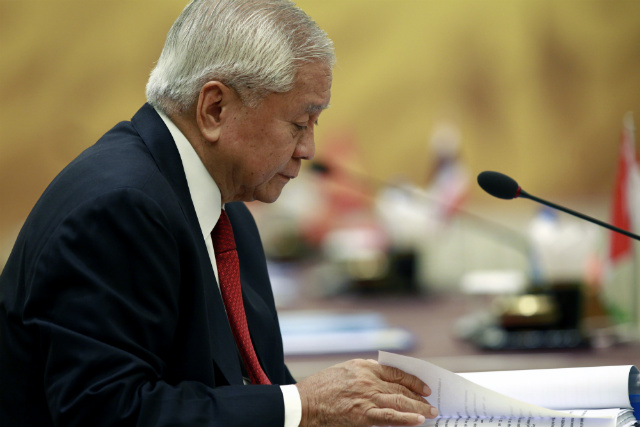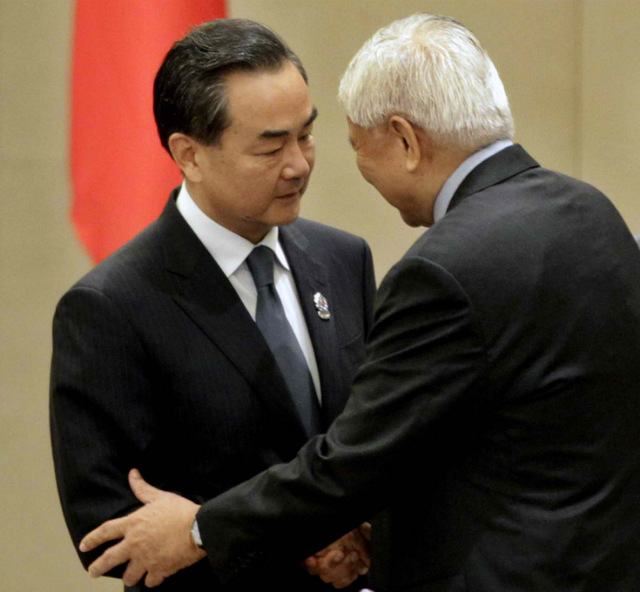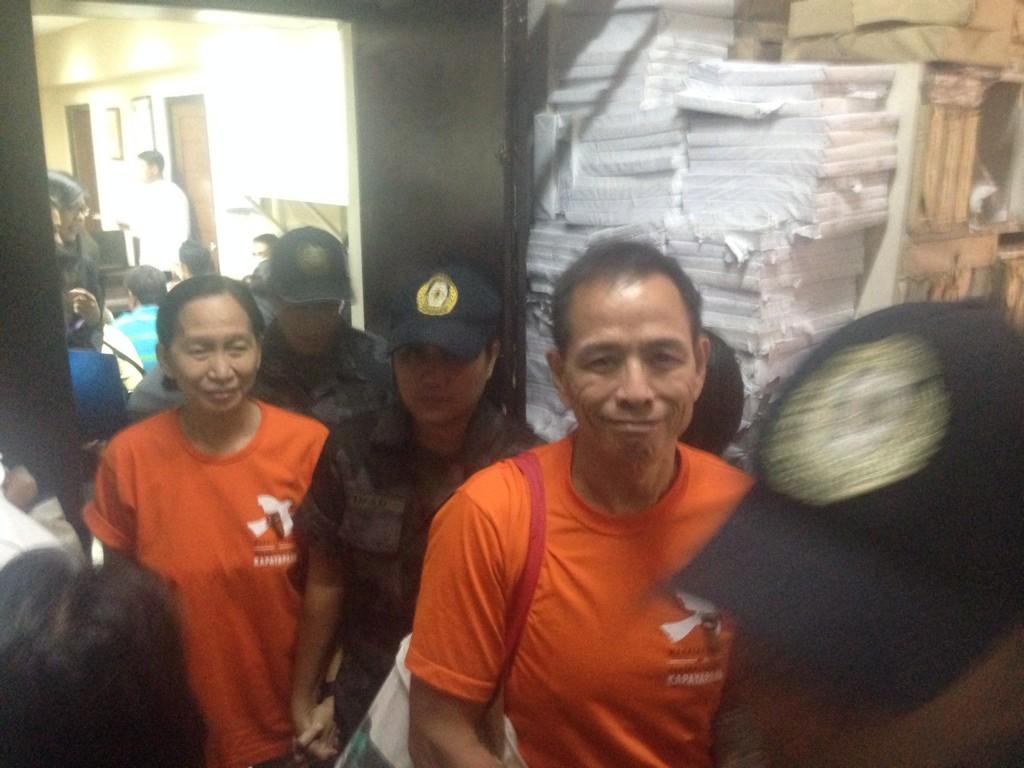From Rappler (Aug 11):
PH hits China over sea plan: 'We're humoring ourselves'
Philippine Foreign Secretary Albert del Rosario says while China rejected the South China Sea plan, Manila's proposal got no objections from ASEAN
 TOP DIPLOMAT. Philippine
Secretary Albert del Rosario reads as he attends the meeting of the Southeast
Asian Nuclear-Weapon-Free-Zone commission at Myanmar
International Convention
Center in Naypyitaw,
Myanmar on
August 8, 2014. Myanmar
is the host country of the 47th Association of Southeast Asian Nations Foreign
Ministers' Meeting and 21st ASEAN Regional Forum. Photo by Lynn Bo Bo/EPA
The Philippines criticized China on Monday, August 11, for rejecting Manila's plan to freeze provocative activities in the South China Sea even as its Southeast Asian neighbors, in a “unique” move, posed no objections.
TOP DIPLOMAT. Philippine
Secretary Albert del Rosario reads as he attends the meeting of the Southeast
Asian Nuclear-Weapon-Free-Zone commission at Myanmar
International Convention
Center in Naypyitaw,
Myanmar on
August 8, 2014. Myanmar
is the host country of the 47th Association of Southeast Asian Nations Foreign
Ministers' Meeting and 21st ASEAN Regional Forum. Photo by Lynn Bo Bo/EPA
The Philippines criticized China on Monday, August 11, for rejecting Manila's plan to freeze provocative activities in the South China Sea even as its Southeast Asian neighbors, in a “unique” move, posed no objections.
In an interview with reporters, Philippine Foreign Secretary Albert del Rosario pointed out that the Philippines' Triple Action Plan (TAP) is centered on the Declaration on the Conduct (DOC) of Parties in the South China Sea, a 2002 statement that aims to prevent tension and ensure maritime security.
Both the Philippines and China signed the DOC. Both countries also use the DOC against each other.
Del Rosario explained: “The TAP, if you take a look at it, is DOC-centered. And the message that I wanted to deliver is, TAP is good because it's DOC. If you don't accept TAP, then you don't believe in DOC. So let's stop talking about DOC, right? We're just humoring ourselves, 'di ba (right)?”
Del Rosario
presented the TAP to the Association of Southeast Asian Nations (ASEAN) Ministerial Meeting in Myanmar from Friday to Sunday, August 8 to August 10. The TAP calls for, among other things, a moratorium on actions that raise tensions in the disputed South China Sea, parts of which the Philippines claims as the West Philippine Sea.
'Unique' for ASEAN
While Del Rosario strongly pushed for the TAP, the ASEAN foreign ministers did not explicitly support it in their joint communiqué after their meeting. The Philippines' Department of Foreign Affairs (DFA), however, said the ministers adopted “parts” of the TAP as “doable.”
“Everyone agreed that there was a problem, that we needed to come up with a solution to the problem,” Del Rosario said.
“And when we put the TAP on the table, there were no objections. This is unique for ASEAN that an initiative does not encounter objections. I think people in ASEAN understood that we need to do something. Some spoke out. Some spoke out loudly. I know that there were sectors that believed in quieting things down, but as I said, from some sectors, the reaction was muted,” he explained.
 SEA ROW. Chinese
Foreign Minister Wang Yi (left) shakes hands with Philippine Foreign Secretary
Albert del Rosario (right) during the the Association of Southeast Asian
Nations-China Ministerial Meeting at the Myanmar International Convention
Center in Naypyitaw, Myanmar on August 9, 2014. Photo by Nyein Chang Naing/EPA
SEA ROW. Chinese
Foreign Minister Wang Yi (left) shakes hands with Philippine Foreign Secretary
Albert del Rosario (right) during the the Association of Southeast Asian
Nations-China Ministerial Meeting at the Myanmar International Convention
Center in Naypyitaw, Myanmar on August 9, 2014. Photo by Nyein Chang Naing/EPA
On the “muted” voices, he noted there “is a difference between being quiet and being openly supportive.” He said, “I think if you're quiet, it's also a manifestation of support. You can support something quietly. You don't have to be vocal about it.”
“The fact that there were no objections, I take that to mean that ASEAN was fully supportive,” Del Rosario said.
The DFA earlier said at least 3 countries – Vietnam, Indonesia, and Brunei –
support the TAP.
China: Philippines 'contradicts' TAP
China, for its part, rejected the TAP by saying it “can build what it wants” in the South China Sea, according to Reuters.
Quoted by the Wall Street Journal, Chinese Foreign Minister Wang Yi said the Philippines' behavior “contradicts” its own proposal.
Wang questioned the Philippines' historic case against China even as legal moves fall under the TAP's “final approach”
Wang said: “If the Philippines wish to pursue its 3-step plan, it should withdraw its push for international arbitration and return to the first step....They've already skipped straight to the third step. Their behavior already contradicts their own proposals.”
Wang was apparently referring to the moratorium as the first step, and arbitration as the third step.
DFA spokesman Charles Jose, on the other hand, clarified that the TAP shouldn't be understood in terms of “steps.” (READ: Philippines denies violating own South China Sea plan)
The immediate, intermediate, and final approaches under the TAP “could be held simultaneously, not necessarily consecutively,” Jose told reporters. “We didn't call it a step. We call it an approach.”
China the 'object' of TAP
Experts, however, believe the TAP will not work without China's consent.
China is the “object” of the TAP, maritime law expert Jay Batongbacal explained in an interview with Rappler. (READ: Philippines' 'triple action plan' without China?)
“But China has already said that it will not abide by a moratorium...so where else will that go? If you're talking about effectively stopping or preventing China from changing the status quo, clearly it's not going to work because of that statement,” Batongbacal said.
Despite Beijing's rejection, the Philippines asserts the TAP
can help China itself.
“We believe that our framework proposal is positive, constructive, and comprehensive, and will be beneficial to everyone in the region, including China,” Jose earlier said.
The Philippines proposed the TAP after China allegedly started building artificial islands in the South China Sea. For the Philippines, this changes the status quo in the disputed waters – a violation of the DOC.
http://www.rappler.com/nation/65914-philippines-china-triple-action-plan-asean













